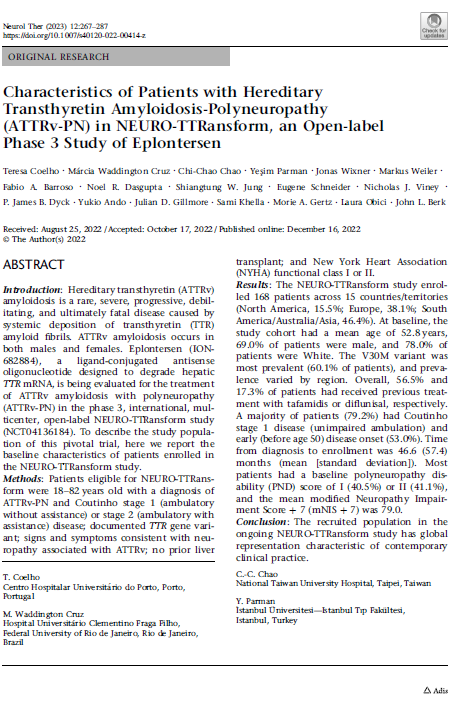Characteristics of Patients with Hereditary Transthyretin Amyloidosis-Polyneuropathy (ATTRv-PN) in NEURO-TTRansform, an Open-label Phase 3 Study of Eplontersen
Dec 2022
Abstract
Introduction
Hereditary transthyretin (ATTRv) amyloidosis is a rare, severe, progressive, debilitating, and ultimately fatal disease caused by systemic deposition of transthyretin (TTR) amyloid fibrils. ATTRv amyloidosis occurs in both males and females. Eplontersen (ION-682884), a ligand-conjugated antisense oligonucleotide designed to degrade hepatic TTR mRNA, is being evaluated for the treatment of ATTRv amyloidosis with polyneuropathy (ATTRv-PN) in the phase 3, international, multicenter, open-label NEURO-TTRansform study (NCT04136184). To describe the study population of this pivotal trial, here we report the baseline characteristics of patients enrolled in the NEURO-TTRansform study.
Methods
Patients eligible for NEURO-TTRansform were 18–82 years old with a diagnosis of ATTRv-PN and Coutinho stage 1 (ambulatory without assistance) or stage 2 (ambulatory with assistance) disease; documented TTR gene variant; signs and symptoms consistent with neuropathy associated with ATTRv; no prior liver transplant; and New York Heart Association (NYHA) functional class I or II.
Results
The NEURO-TTRansform study enrolled 168 patients across 15 countries/territories (North America, 15.5%; Europe, 38.1%; South America/Australia/Asia, 46.4%). At baseline, the study cohort had a mean age of 52.8 years, 69.0% of patients were male, and 78.0% of patients were White. The V30M variant was most prevalent (60.1% of patients), and prevalence varied by region. Overall, 56.5% and 17.3% of patients had received previous treatment with tafamidis or diflunisal, respectively. A majority of patients (79.2%) had Coutinho stage 1 disease (unimpaired ambulation) and early (before age 50) disease onset (53.0%). Time from diagnosis to enrollment was 46.6 (57.4) months (mean [standard deviation]). Most patients had a baseline polyneuropathy disability (PND) score of I (40.5%) or II (41.1%), and the mean modified Neuropathy Impairment Score + 7 (mNIS + 7) was 79.0.
Conclusion
The recruited population in the ongoing NEURO-TTRansform study has global representation characteristic of contemporary clinical practice.

